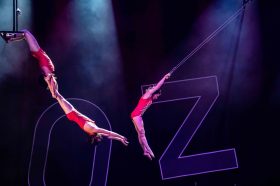Oh, dear reader, what joy takes over this critic’s heart when an audience member is enjoying themselves! When they’re connecting with the MC and feeling relaxed and comfortable in their surroundings. When the music just takes them over, as it were. When they, in an infuriating nutshell, start tapping their feet. Or, considering the usually atrocious time–keeping which these pitter–patterers offend their surroundings with, perhaps it’s not so much the music taking them over but something else – for if it was truly the music, then one would expect that surely, surely, said music would impart a bit of rhythm as it entered its new host, a bit of precision and flair to proceedings. And yet some of these foot–tappers get so far behind the beat that one wonders if this lateness is apparent in other parts of their lives. Do they, for instance, smash through ticket barriers in car parks because their arms didn’t reach out to retrieve the ticket before their foot hit the accelerator? Or do they only notice, perhaps, that they’ve come to the edge of a cliff after they’ve walked off of it? (One can only hope.)
Admittedly, the music was the type that allowed for the occasional foot tapping. The concert, in the City Recital Hall, was entitled Vienna on Fire, and was performed by the Johann Strauss Ensemble, which the slim program tells us is not only ‘back by popular demand’, but is the ‘most authentic [performer] of Strauss music in the world’. (It also tells us that in one of the pieces, ‘the conductor plays the ANVIL!’. (Capital letters preserved from the original text.) If you detect a hint of snobbery in my mention of this, you’d be correct; but this critic often turns a cynical eye on the marketing spin that often comes with blurbs, though thankfully the music itself is rarely tainted by it.)
For once, I wasn’t sure what I expected from a concert such as this, and though I only had some vague ideas I was still somewhat disappointed by it; partly because of the unmet expectations, partly due to its lacklustre comedy. I thought I’d be getting something akin to a Vienna Philharmonic Orchestra New Year’s Day Concert, broadcast live around the world (reaching SBS in Australia in the evening of the 1st January) from the Musikverein in Vienna. It was the same sort of program – waltzes and polkas and whatnot, with a heavy reliance on the Strauss dynasty – but, most likely because one wasn’t filled with the New Year’s glow, the magic wasn’t quite there. Also, out of the venues in Sydney, the City Recital Hall is probably the least suited to such a gala–esque festivity – modernity clings to its sterilised walls. (Still, the recent Weimar Cabaret concert of the ACO showed us that an atmosphere can be created if one wants to, but that wasn’t the case here.)
Secondly, and far more importantly, the humour, for this critic at least (and one wishes to acknowledge that many in the audience, including the shoe–thumper next to me, would say differently), was, for the most part, rather weak. The structure of the concert was an exploration of the music of the various Strausses, interspersed with comments from the conductor and lead violinist, Australian Russell McGregor. He was amiable enough, and had some intriguing stories, but after having been treated to such delights as the Spaghetti Western Orchestra’s irreverent take on Ennio Morricone’s music, or the absurdities of Mnozil Brass, or Dame Edna with the Sydney Symphony, or Barry Humphries with the aforementioned Weimar Cabaret, or the Sydney Symphony’s concert dedicated to Gershwin with its charismatic conductor, this concert pales in comparison.
Which isn’t to say that McGregor was unwise to act as MC (but one has seen better) or that he in any way embarrassed himself. The orchestra themselves also chirped in for the occasional punchline or a bit of slapstick, including the three–man struggle to get the much–promoted anvil onto stage (followed by a one–woman walk to get it off), and a percussionist who added some flourishes to his bird-whistling during the Dorfschwalben aus Osterreich (Village Swallows from Austria).
The music was rather wonderful, however, although the sameness of the program tended to blur it all together in this critic’s head. Which is not to say that the waltzes and polkas all sounded the same, mind you – obviously not – but one can only hear so many waltzes before one yearns for something else. Three or four encores were performed, although that was more to make up the two hour running time that most concerts aim for, which always irks this critic. (One is very irked in this review, it seems.) The performances were pleasing, but, all in all, the experience was not as uplifting as one would’ve hoped.
Rating: 3 stars out of 5
Vienna on Fire
Johann Strauss Ensemble
Russell McGregor (conductor)
Eduard Strauss – Mit Extrapost
Johann Strauss (Son) – Wiener Blut
Johann Strauss (Father) – Jugendfeuer – Galopp
Josef Strauss – Frauenherz
Johann Strauss – Banditen-Galopp
Johann Strauss – Rosen aus dem Suden
Josef Strauss – Dorfschwalben aus Osterreich
Eduard Strauss – Bahn frei
Hans Chr. Lumbye – Champagnergalopp
Josef Strauss – Feuerfest
Johann Strauss (Son) – Unter Donner and Blitz
Johann Strauss (Son) – Kunstlerleben
City Recital Hall, Sydney
16 July





